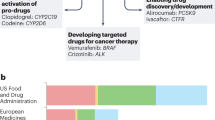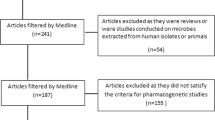Abstract
Some pharmacogenetic tests may provide ancillary disease risk information. To evaluate evidence and assess the social and policy implications of ancillary disease risk information associated with candidate pharmacogenetic variants, We conducted a literature search and abstract review of disease susceptibility studies for each of 42 gene variants potentially associated with drug response. Twenty-two variants (53%) had suggested association with disease risk in at least two studies, and sixteen (38%) were for diseases other than the pharmacogenetic indication. Seven variants (16%) were associated with risk for at least two different diseases. Pharmacogenetic tests have the potential to provide ancillary disease risk information, and this potential should be considered as pharmacogenetic tests are brought into clinical use. Implications will vary with each test but tests should be evaluated individually within a framework that outlines the potential implications of ancillary information.
This is a preview of subscription content, access via your institution
Access options
Subscribe to this journal
Receive 6 print issues and online access
$259.00 per year
only $43.17 per issue
Buy this article
- Purchase on Springer Link
- Instant access to full article PDF
Prices may be subject to local taxes which are calculated during checkout
Similar content being viewed by others
References
Weinshilboum R . Inheritance and drug response. N Engl J Med 2003; 348: 529–537.
Motulsky AG . Drug reactions enzymes, and biochemical genetics. J Am Med Assoc 1957; 165: 835–837.
Breckenridge A et al. Pharmacogenetics: ethical problems and solutions. Nat Rev Genet 2004; 5: 676–680.
Buchanan A et al. Pharmacogenetics: ethical issues and policy options. Kennedy Inst Ethics J 2002; 12: 1–15.
Sankar P, Kahn J . BiDil: Race Medicine Or Race Marketing? Health Aff (Millwood) 2005; Web exclusive: W5–W455, to W5–W463.
Goldstein DB, Tate SK, Sisodiya SM . Pharmacogenetics goes genomic. Nat Rev Genet 2003; 4: 937–947.
Netzer C, Biller-Andorno N . Pharmacogenetic testing, informed consent and the problem of secondary information. Bioethics 2004; 18: 344–360.
Lipton P, Afshar H, Bobrow CBE M, Caldwell J, Lindpaintner K, Rawlins M, Rose N, Starey N, Weale A . Pharmacogenetics: ethical issues, (ed. Bioethics, N.C.o.) Nuffield Council on Bioethics, London, 2003.
Lehmann DJ et al. Large meta-analysis establishes the ACE insertion-deletion polymorphism as a marker of Alzheimer's disease. Am J Epidemiol 2005; 162: 305–317.
Rodriguez-Carreon AA et al. Tumor necrosis factor-alpha -308 promoter polymorphism contributes independently to HLA alleles in the severity of rheumatoid arthritis in Mexicans. J Autoimmun 2005; 24: 63–68.
Correa PA, Gomez LM, Cadena J, Anaya JM . Autoimmunity and tuberculosis. Opposite association with TNF polymorphism. J Rheumatol 2005; 32: 219–224.
Woolley N, Mustalahti K, Maki M, Partanen J . Cytokine gene polymorphisms and genetic association with coeliac disease in the Finnish population. Scand J Immunol 2005; 61: 51–56.
Yamamoto-Furusho JK et al. Polymorphisms in the promoter region of tumor necrosis factor alpha (TNF-alpha) and the HLA-DRB1 locus in Mexican mestizo patients with ulcerative colitis. Immunol Lett 2004; 95: 31–35.
Foley PF et al. Association studies of neurotransmitter gene polymorphisms in alcoholic Caucasians. Ann N Y Acad Sci 2004; 1025: 39–46.
Young RM, Lawford BR, Nutting A, Noble EP . Advances in molecular genetics and the prevention and treatment of substance misuse: Implications of association studies of the A1 allele of the D2 dopamine receptor gene. Addict Behav 2004; 29: 1275–1294.
Erblich J, Lerman C, Self DW, Diaz GA, Bovbjerg DH . Stress-induced cigarette craving: effects of the DRD2 TaqI RFLP and SLC6A3 VNTR polymorphisms. Pharmacogenomics J 2004; 4: 102–109.
Erblich J, Lerman C, Self DW, Diaz GA, Bovbjerg DH . Effects of dopamine D2 receptor (DRD2) and transporter (SLC6A3) polymorphisms on smoking cue-induced cigarette craving among African-American smokers. Mol Psychiatry 2005; 10: 407–414.
Pritchard A et al. Association study and meta-analysis of low-density lipoprotein receptor related protein in Alzheimer's disease. Neurosci Lett 2005; 382: 221–226.
Ordovas JM, Mooser V . The APOE locus and the pharmacogenetics of lipid response. Curr Opin Lipidol 2002; 13: 113–117.
Bailey LB . Folate, Methyl-Related Nutrients, Alcohol, and the MTHFR 677C → T Polymorphism Affect Cancer Risk: Intake Recommendations. J Nutr 2003; 133: 3748S–33753.
Lea RA et al. Genetic variants of angiotensin converting enzyme and methylenetetrahydrofolate reductase may act in combination to increase migraine susceptibility. Brain Res Mol Brain Res 2005; 136: 112–117.
Relton CL et al. Gene-gene interaction in folate-related genes and risk of neural tube defects in a UK population. J Med Genet 2004; 41: 256–260.
Kelly PJ et al. Homocysteine, MTHFR 677C → T polymorphism, and risk of ischemic stroke: results of a meta-analysis. Neurology 2002; 59: 529–536.
Hong YC et al. Polymorphisms of XRCC1 gene, alcohol consumption and colorectal cancer. Int J Cancer 2005; 116: 428–432.
La Torre G, Boccia S, Ricciardi G . Glutathione S-transferase M1 status and gastric cancer risk: a meta-analysis. Cancer Lett 2005; 217: 53–60.
Wenzlaff AS, Cote ML, Bock CH, Land SJ, Schwartz AG . GSTM1, GSTT1 and GSTP1 polymorphisms, environmental tobacco smoke exposure and risk of lung cancer among never smokers: a population-based study. Carcinogenesis 2005; 26: 395–401.
Mellen PB, Herrington DM . Pharmacogenomics of blood pressure response to antihypertensive treatment. J Hypertens 2005; 23: 1311–1325.
Boekholdt SM et al. Cholesteryl ester transfer protein TaqIB variant, high-density lipoprotein cholesterol levels, cardiovascular risk, and efficacy of pravastatin treatment: individual patient meta-analysis of 13 677 subjects. Circulation 2005; 111: 278–287.
Davis BR et al. Antihypertensive therapy, the alpha-adducin polymorphism, and cardiovascular disease in high-risk hypertensive persons: the Genetics of Hypertension-Associated Treatment Study. Pharmacogenomics J 2006.
Tantisira KG, Weiss ST . The pharmacogenetics of asthma: an update. Curr Opin Mol Ther 2005; 7: 209–217.
Feldman DS, Carnes CA, Abraham WT, Bristow MR . Mechanisms of disease: beta-adrenergic receptors – alterations in signal transduction and pharmacogenomics in heart failure. Nat Clin Pract Cardiovasc Med 2005; 2: 475–483.
Binder EB, Holsboer F . Pharmacogenomics and antidepressant drugs. Ann Med 2006; 38: 82–94.
Green MJ, Botkin JR . ‘Genetic exceptionalism’ in medicine: clarifying the differences between genetic and nongenetic tests. Ann Intern Med 2003; 138: 571–575.
Gostin LO, Hodge JG . Genetic privacy and the law: an end to genetics exceptionalism. Jurimetrics 1999; 40: 21–58.
Faden RR et al. Public stem cell banks: considerations of justice in stem cell research and therapy. Hastings Cent Rep 2003; 33: 13–27.
Hirschhorn JN, Lohmueller K, Byrne E, Hirschhorn K . A comprehensive review of genetic association studies. Genet Med 2002; 4: 45–61.
Acknowledgements
This work was supported in part by the UW NHGRI and NICHD sponsored Center for Genomics and Healthcare Equality, Grant #: P50HG003374 and the University of Washington Biobehavioral Cancer Prevention and Control Training Program (NIH-R25 CA92408). We also acknowledge the contributions of the Pharmacogenetics Working Group of the UW Center for Genomics and Healthcare Equality to the design and discussion of this study.
Author information
Authors and Affiliations
Corresponding author
Additional information
Duality of Interest
These authors state no conflict of interest.
Rights and permissions
About this article
Cite this article
Henrikson, N., Burke, W. & Veenstra, D. Ancillary risk information and pharmacogenetic tests: social and policy implications. Pharmacogenomics J 8, 85–89 (2008). https://doi.org/10.1038/sj.tpj.6500457
Received:
Revised:
Accepted:
Published:
Issue Date:
DOI: https://doi.org/10.1038/sj.tpj.6500457
Keywords
This article is cited by
-
A Closer Look at the Recommended Criteria for Disclosing Genetic Results: Perspectives of Medical Genetic Specialists, Genomic Researchers, and Institutional Review Board Chairs
Journal of Genetic Counseling (2013)
-
Informed consent in the context of pharmacogenomic research: ethical considerations
The Pharmacogenomics Journal (2011)



